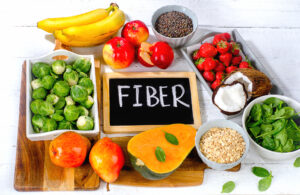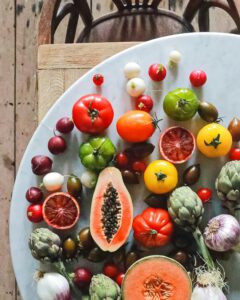 In the ever-evolving landscape of nutrition and wellness, one dietary component that continues to stand the test of time is fiber.
In the ever-evolving landscape of nutrition and wellness, one dietary component that continues to stand the test of time is fiber.
Often applauded as a key player in maintaining a healthy lifestyle, high fiber foods offer a variety of benefits that contribute to our overall health and well-being. This article describes what fiber is, what its proven health benefits are, and the top foods that contain it.
What is Fiber?
Fiber, the indigestible part of plant foods, is a versatile compound that comes in two forms: soluble and insoluble. Soluble fiber dissolves in water, forming a gel-like substance that aids in regulating blood sugar levels and lowering cholesterol. Insoluble fiber adds bulk to the stool, promoting healthy digestion and preventing constipation. Together, these forms contribute to the overall health of our digestive system.
Health Benefits of High Fiber Foods:
- Digestive Harmony: Insoluble fiber, found in vegetables like broccoli and Brussels sprouts, promotes regular bowel movements, preventing constipation and maintaining a healthy digestive system. Studies in the “Journal of Nutrition” emphasize its role in preventing gastrointestinal disorders.
- Heart-Friendly Nutrients: Soluble fiber-rich foods, such as berries and oats, contribute to heart health by lowering cholesterol levels. Research published in the “American Journal of Clinical Nutrition” suggests that a diet high in soluble fiber may significantly reduce the risk of cardiovascular diseases, providing a positive impact on overall longevity.
- Blood Sugar Stability: Fibrous fruits like apples and pears contain soluble fiber that aids in stabilizing blood sugar levels. A study in “Diabetes Care” highlights the positive impact of soluble fiber in reducing the risk of type 2 diabetes and supporting overall blood sugar regulation.
- Weight Management Support: High fiber foods, such as nuts and seeds, contribute to weight management by promoting a feeling of fullness. Research in the “International Journal of Obesity” supports the fact that incorporating nuts and seeds into the diet can assist in weight loss and maintenance.
Studies on How Fiber Extends Life:
Numerous studies have explored the correlation between high fiber intake and an extended life. A comprehensive analysis published in the “British Medical Journal” found that a diet rich in fiber is associated with a longer, healthier life. This is proof of the enduring impact of integrating fiber into our daily meals. A 25% reduction in death from all causes was observed for those consuming the most fiber.
7 of the Best High Fiber Foods with Studies on Their Benefits:
- Broccoli: Rich in insoluble fiber, broccoli promotes intestinal health. Studies in the “International Journal of Molecular Sciences” suggest that compounds in broccoli may have anti-cancer properties, contributing to a longer and healthier life.
- Berries (Blueberries, Raspberries): Packed with soluble fiber and antioxidants, berries support heart health. Research in the “Journal of Agricultural and Food Chemistry” indicates that the compounds in berries may have anti-aging effects.
- Almonds: Almonds, a fiber-rich nut, contribute to weight management. The “Journal of Nutrition” suggests that the inclusion of nuts in the diet is associated with a reduced risk of cardiovascular diseases.
- Avocado: Avocado, which is high in both soluble and insoluble fiber, supports heart health. A study in the “Journal of the American Heart Association” suggests that avocado consumption is linked to improved cardiovascular outcomes.
- Spinach: Spinach is a fiber-packed leafy green. A study in the “European Journal of Nutrition” suggests that the fiber and antioxidants in spinach may contribute to improved gut health.
- Oranges: Oranges, rich in soluble fiber, contribute to blood sugar stability. Studies in “Diabetes Care” emphasize the positive impact of citrus fruits on reducing the risk of type 2 diabetes.
- Sweet Potatoes: Sweet potatoes, a fiber-rich vegetable, supports digestive health. The “Journal of Medicinal Food” highlights the potential anti-inflammatory and anti-cancer effects of the antioxidants in sweet potatoes.
Other High Fiber Foods:
In addition to the foods mentioned above, other high fiber foods include Brussels sprouts, kale, artichokes, lentils, bananas, peas, apples, chia seeds, sunflower seeds and carrots. These foods add diversity to a fiber-rich diet.
Lowest Fiber Foods:
Low fiber foods include highly processed snacks and foods like white bread, white biscuits, pancakes, cookies, chips, and sugary beverages.
Conclusion:
From supporting digestive health to fostering heart-friendly environments, high fiber foods contribute to a longer, healthier life. As we enjoy the vibrant flavors of fruits, vegetables, nuts, and seeds, lets envision the prospect of a long-lived future filled with health and vitality.
This health news is provided by Nutrition Breakthroughs, maker of the original calcium and magnesium based sleep aid Sleep Minerals II, and Joints and More, a natural supplement for joint relief, less aches and pains, and more energy.




